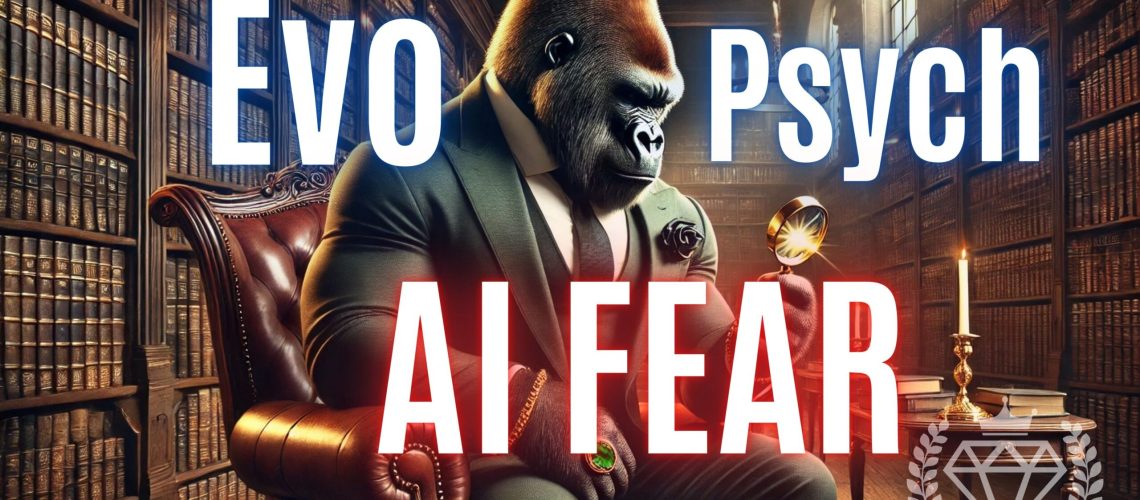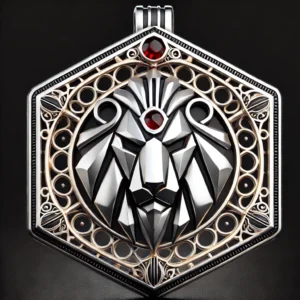Why We Fear AI – And Why We Shouldn’t
There’s a lot of talk about AI these days. Some people claim it’s a kind of theft, a machine-made knockoff of human creativity. But that claim misses the real story. To understand AI—and our unease about it—you need to dig deeper.
Why “AI is Theft” Is the Wrong Argument
When people say “AI is theft,” they mean that it’s drawing on human-made knowledge, digesting and reworking it. They suggest it’s unfair, maybe even unethical. But let’s look at the facts: Just as humans learn from the information around them, so does AI. It synthesizes data without copying or taking credit. No courts have found that AI actually recreates specific ideas accidentally. The “theft” narrative is convenient but lacks the rigor of reality. We fear something much more fundamental—and that’s what we’ll get to next.
The Real Reason We Fear AI: Evolution and Competition
Our fear of AI is not really about data or ethics; it’s about something deeper, something old. For thousands of years, humanity has climbed to the top through our intelligence and creativity. We’ve held our place because of our memories, our strategic thinking, and our ability to communicate and create. These are our survival traits, and they’ve become central to our identity. But when a machine appears that can do things we once thought only humans could do, it shakes us to our core.
AI taps into something ancient within us. It triggers a sense of competition, even threat. Think of Game Theory—each of us has a role to play, a function in the grand “game” of life. When AI shows it can play that game, we’re unsettled because it challenges us at a level deeper than intellect. It’s the fight-or-flight response, that primal feeling we can’t shake.
A New Kind of Fire
But here’s another perspective. Let’s consider AI not as a threat, but as a kind of fire—one of the greatest tools humanity ever discovered. Fire let us cook, warm, and create; it let us reshape our world. Imagine AI as a fire of consciousness. It opens doors, democratizing knowledge, providing tools that once only the largest enterprises could afford. It doesn’t compete with us; it enables us to do more than we thought possible.
Take the jewelry industry, for example. AI allows a small designer to forecast trends, streamline production, and create customer experiences with the same finesse as a global brand. The potential of AI is transformative, not as a competitor but as a collaborator, a tool that lets humanity amplify what we do best.
AI isn’t here to take away from human creativity; it’s here to enhance it. You have a choice: Be part of the next great transformation or sit on the sidelines, watching. For those who want to harness the potential of AI, start today. Download our Free AI Tools and see what they can do for you. As we move forward, we’ll go further together.
Is AI theft? Is AI plagiarism? I'm going to address this once and for all because after two years with generative AI on the market for everybody to have access to, if there has not been a single successful copyright claim because of the use of either a text-based or visually based AI, if there has not been a successful copyright claim legally that has gone through and been successful and resulted in some type of damages being paid, then I think we're in the clear. I think that'll be that. I think we can put this to bed.
The reason for this criticism is because of the way an AI model is trained. Whether it's through images or through a corpus of text data, the AI would have been trained on everything on the internet. So that would have been all of our contributions as creative humans to civilization up on the internet—that's what these models were trained on. So the argument that AI stole information and that's why ChatGPT can write language and it's just predicting the next word based on all the human inputs—the argument being made is that that was a form of theft, that we didn't sign up for this data to be used, neither did all of the brilliant minds that have contributed their knowledge to humanity and have since passed away.
Nobody ever brings up that that has been factored in as well—that we've created this superhuman mind. But the idea is that because it was trained on this data, it stole the data, stole our knowledge, and is now just giving us copies of our own knowledge back to us. Now, I'm going to unpack this and put this to bed because I've been using this technology in-depth, really heavily, for the last 3 years. And then before that, I was getting started with AI in 2016. So this is not somebody that just picked up ChatGPT and is now excited about AI. I am an actual expert on how to use this stuff creatively.
Okay, so let's think about this criticism and why I think it isn't founded on anything real, and why I think it's more founded on fear. Now, the idea that the AI would learn from knowledge out in the universe, on planet Earth, in our internet, and then regurgitate that information, isn't exactly true if you understand how mental models work. As a human, we combine ideas. Say we were designing a piece of jewelry. If I start thinking, you know, what would be a cool piece of jewelry? I want to make a lion head pendant, but not just any lion head pendant—I want this to be inspired by Victorian architecture, and I still want it to be futuristic. Wow, I'm really thinking like a visionary jeweler now. I have an idea of a piece of jewelry that I want to make that nobody's ever made before. Is that any different so far from what a human being would do?
The answer is no. You'd be combining ideas in your mind, and then you could theoretically go create this piece of jewelry. Now, if you wanted to do that, it would take a lot of time over years to become an expert. This is the real reason they’re upset. It’s because it would take years to become an expert in all the things you’d need to know, from 3D CAD design to jewelry manufacturing and knowing all the metals, all the details, and all the artistic influences you'd absorb over time. Before, it would have taken a long time to be the person who could create that work of art. In this case, the medium is a piece of jewelry because it's so complex, and this is Jeweler's Advantage, so it would have taken a long time.
That is why they're threatened by this idea—that now you can get a really quick idea of what that would look like through an AI image generator, and I don't need to know how to make that piece of jewelry. But I simply had an idea, and I want to visualize it, and I want to see it. But the thing is, if I did it that way and it was a lion and Victorian architecture and futuristic minimalism, it’s probable that there isn’t anything exactly like that idea. There's probably not another human out there that has made that piece of jewelry yet—that is my idea of something that could come together.
So, in that way, if I were to create this image and then go on and use AI to help figure out how I'm going to manufacture this piece, get it made, polished, and ready for delivery to a customer, I could now do that because of AI. I could visualize it, and I could get all of the steps in text to figure out exactly how to do that. In that way, I'm just using a tool the way a caveman would bang rocks together to start a fire. It’s essentially the same thing without me sitting there deciding I want to be the caveman starting that fire, or I am the jeweler that's going to create this jewelry design, set it in motion, do the work, and be the human who assigns the meaning that this matters—that this is important, and I've decided it's important.
In that regard, AI is just a tool to achieve that aim. I'm taking influences of information through the world, whether I'm using AI or not. I'm deciding based on what I've seen that I want to make this piece of jewelry. Then I'm combining that information and communicating to the world, through this jewelry, my vision. This is the real reason people are so upset with AI: it has demonstrated that it has surpassed our greatest evolutionary advantage as human beings. Let me say that again—the real reason that people are so upset with AI is that they feel threatened. They feel a fight-or-flight response to something new in their environment that they feel is threatening them as a species.
As human beings, our greatest evolutionary advantage—and this isn't just my idea; you could read the book Evolutionary Psychology by Dr. David Buss, which is a great source on this type of topic if we're talking about caveman psychology—he would argue and agree that the greatest advantage of a human being is that we can take in information from our environment, process it, and then communicate it to one another through language or visual signals. That's what makes us different from a tiger, from a lion, from a bald eagle, or a hawk, or a falcon, or a shark, or any of the other top predators on planet Earth.
That is what separates us: our ability to gather information, process it, combine ideas, and communicate them to one another. That is what makes us the apex predator on planet Earth—that single principle. And because someone has created a tool, they've created a way to bang two rocks together and make a special kind of fire that can compete with that latent ability, that gives us an advantage in the ecosystem as human beings. And because, inherently, we know, whether you've heard this idea before or not, that deep down, at the core of the ancient mechanisms of your brain and the very essence of your being, you know that this is true—that this is what makes you special as a human being—because that has been shown to be made into a tool that has completely leveled the playing field. So now, your IQ and your intellect are no longer the evolutionary advantage or the advantage in the marketplace or environment that you thought it was. That is why, if you don’t like AI, that is why you feel threatened by it.
It has nothing to do with some moral reason of theft. Now we have to attack the morality of it because I can’t explain the primordial rage I feel at seeing something pass me in my ability to survive. So we have to attack the morality of it instead because I can make sense of that with my emotions, and I’m combining that information in my mind to explain it. So, we have to make it a moral issue—it’s theft now, it’s a plagiarism machine. It’s none of those things. All it is is the ultimate, scaled version of taking in information from our environment and recombining it in a different way. And it’s accessible to everybody. It no longer matters as much to be the smartest person in the environment.
So if you understand that, and you've got an understanding of mental models and how you can structure ideas and combine them, you can combine ideas by understanding how to compartmentalize different creative influences and then decide how you're going to manifest an actual outcome with that combination of ideas. If you understand that, then AI becomes that magic fire, and you can control it. We're all just cavemen. We're all just cavemen that got progressively better and better tools, and we got so proud of these tools. But ultimately, we created our last invention.
And the beautiful thing about it is the greatest minds that have ever existed, who are no longer here to argue about it with us, also participated in creating it. And that's incredible. So, that’s how you should be thinking about AI. You should be thinking about how you can use the productized tool version of the culmination of all of the greatest minds to ever exist, who are still in our hearts and in our minds but no longer here to help us. But if we understand how we can use that fire, they can help us.
So, we can either look at this through a very minimal, fear-based lens that AI is theft—I'm going to attack the morality because I have not processed the real fear that I feel—or we can look at it as the greatest miracle of science that we will ever receive. And that's worth it. It's worth it. It’s worth it to have that. It’s a sacrifice to have it, but it’s a worthy sacrifice to make. And it’s a worthy sacrifice for all of us to make when we put ideas up on the internet moving forward.
So is AI theft, or is it the greatest miracle and gift we’ve ever received? That is completely up to you to decide. So this is Jesse Korby here at Jeweler's Advantage, and I will see you in the next one.


